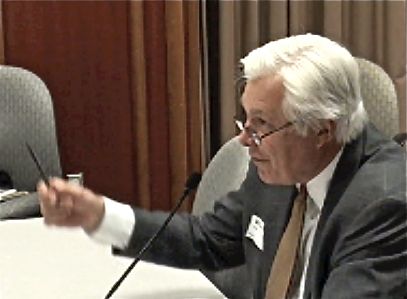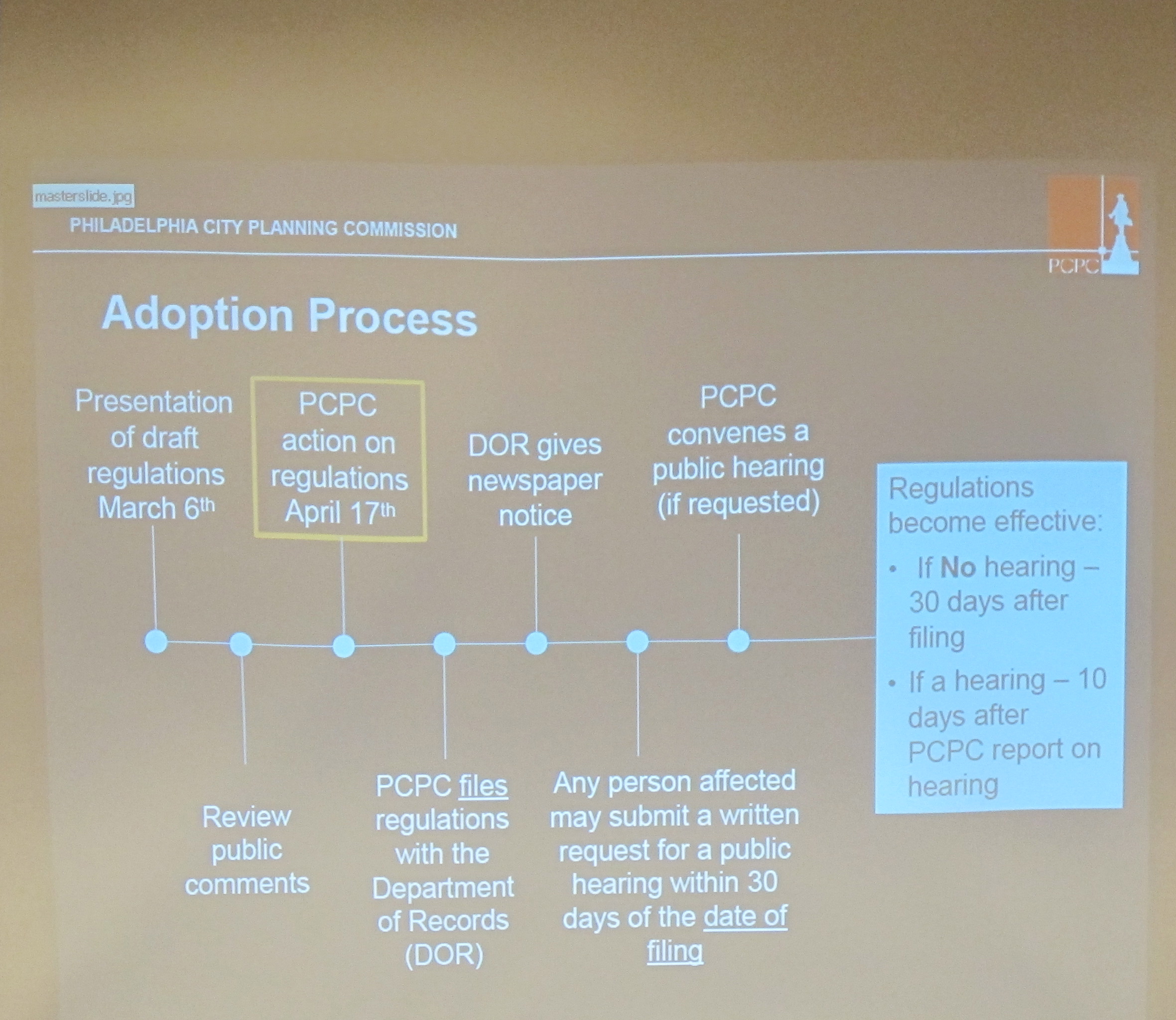New Planning Commission regulations fail to ‘engender human delight’
After an hour’s discussion on Tuesday afternoon, and years of discussion prior to that, the City Planning Commission adopted new regulations aimed at implementing the reformed zoning code.
The latest version of the regulations is updated from the draft that was presented to the Commission last month. Tuesday’s presentation, like the earlier one in March, was given by Commission deputy director Eva Gladstein. At the outset of her presentation, anticipating public testimony in favor of delaying a vote on the regulations, Gladstein sought to assure the Commission and members of the public that a vote would not put an end to discussion of the regulations.
“What we’re asking you to do today,” Gladstein said, addressing Commissioners, “is to formally adopt the regulations. And while that might feel as if it is a final action, in fact, it starts the action that the Home Rule Charter requires.”
Gladstein then outlined the next steps: after adoption, regulations are filed with the Department of Records, which is then required to provide public notice and advertise the regulations in newspapers. Within thirty days of the regulations being filed with Records, anyone who is affected can request an official hearing, at which testimony will be recorded by a stenographer. The Planning Commission is then required to issue a report on the hearing and whether it is accepting any recommendations during it. If no hearing is requested, the regulations go into effect thirty days after being filed with the Department of Records.
Most of Tuesday’s meeting was given over to public testimony about the role of Registered Community Organizations, but Gladstein also reviewed a handful of changes made to regulations related to Civic Design Review (CDR). Among those changes was the removal of a certain phrase, which said that one goal of projects subject to CDR should be to “engender human delight.” Without that burden, CDR projects now must only “Enhance the city’s streets and sidewalks, which represent the greatest percentage of its public realm … function well, and promote vitality and activity.”
Gladstein then outlined the qualifying criteria for Registered Community Organizations (RCOs), of which there are two kinds: local and issue-based.
Local RCOs are required to have written rules, regularly scheduled meetings open to the community, elected leadership, and membership drawn from their registered boundaries. In size, they must cover at least 5 blocks and at most seven square miles. There is an exception for community organizations smaller than five blocks which existed prior to December 22, 2010.
Issue-based RCOs must have governing documents and be incorporated as nonprofit organizations.
In the regulations adopted Tuesday, there is a new “Conflict of Interest Clause,” which states that an organization cannot function as the RCO for a project in which it is also the zoning applicant.
Throughout her presentation, Gladstein emphasized the Planning Commission’s engagement with various community and interest groups in crafting the regulations. She made it clear that the Commission had considered, but not necessarily accepted, all the recommendations it has received since posting the first draft of the regulations last fall.
During the public comment portion of the meeting, nearly all the witnesses asked the Planning Commission to delay its vote on the regulations so more conversations could be had.
Neil Sklaroff, a partner at Ballard Spahr, raised concerns about the regulations possibly going beyond their legal boundaries. He said that it was questionable practice to craft certain Planning Commission regulations related to the new zoning code which are not part of the zoning code itself.
That concern was later echoed by Craig Schelter of Development Workshop. Relatively late in the zoning reform process, Schelter made a successful bid to have all references to “accepted plans” for individual neighborhoods removed from the zoning code. Under the new zoning code, the Planning Commission may either adopt or not adopt individual plans, but there is no provision which authorizes it to consider an “accepted plans,” which are less binding than “adopted plans.” However, the new PCPC regulations do contain references to accepted plans.
In a letter submitted to the Planning Commission, Schelter wrote, “…the ZCC rejected the idea of providing for an accepted plan and decided to drop the concept from the Zoning Code … Here, the drafters are attempting to undo the work of the ZCC and create zoning legislation indirectly where they failed to do so directly.”
As mentioned above, much of Tuesday’s meeting was dedicated to discussion of RCOs.
Borrowing a phrase first used by Supreme Court Justice Clarence Thomas to describe sexual harassment allegations during his confirmation hearings, Bonita Cummings of Strawberry Mansion Community Concern called the formation of Registered Community Organizations “a high-tech lynching, where your rights are being violated.” Cummings and others feel that registering community organizations is a way of marginalizing small groups that form around opposition to certain development projects.
Tiffany Green of Concerned Citizens of Point Breeze testified that the notion of a level playing field among all community organizations is bunk, saying that wealthy people can move into a neighborhood and put together an organization quickly while longtime residents don’t have the same resources. Green said that could lead to “selective notification of the community” by the RCOs that receive first notice of projects from the Planning Commission.
Steve Huntington, speaking on behalf of Center City residents, hoped to get the Planning Commission to ease some of the requirements of RCOs, in particular the provision that requires that they provide a “narrative summary” of their community meetings about CDR projects to the Commission.
“A narrative summary is just a tough task,” Huntington said, pointing out that RCOs are made up of people who volunteer their time.
Greg Pastore, a former Zoning Code Commissioner, and Bryan McHale, a concerned citizen and might-as-well-be-former-Zoning-Code-Commissioner, testified in defense of Registered Community Organizations.
McHale said that RCOs were created in order to force conversations between developers and communities, particularly in projects that involve Civic Design Review. He said that the RCO provision imparts both an opportunity and an obligation on communities to discuss developments in their neighborhoods.
“The fundamental reasons why this was created are sound ones,” McHale said. “Everyone has to have skin in the game.”
Greg Pastore gave an emphatic defense of the RCO provision, saying that if the regulations regarding those organizations were any less burdensome, they wouldn’t exist at all. Pastore said the qualifications to become an RCO amount to little more than self-identification.
The Planning Commission also heard testimony from three residents of Chestnut Hill, who advocated for a third type of RCO, which they referred to as a “Convening RCO.” A Convening RCO would be responsible for coordinating with other RCOs and holding meetings with the developers. The Zoning Code Commission previously considered that suggestion and decided it was out of step with the purpose of creating RCOs.
In the end, after an explicit call for movement on the regulations from Chairman Alan Greenberger, the Planning Commission unanimously adopted the new regulations.
But even before it could do so, several witnesses had already requested a formal hearing.
PlanPhilly will update this story when that hearing is scheduled.
Contact the reporter at jaredbrey@gmail.com and follow him on Twitter @jaredbrey
WHYY is your source for fact-based, in-depth journalism and information. As a nonprofit organization, we rely on financial support from readers like you. Please give today.








